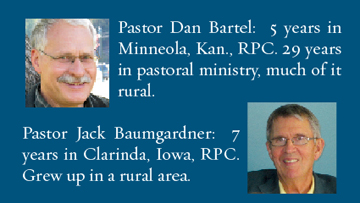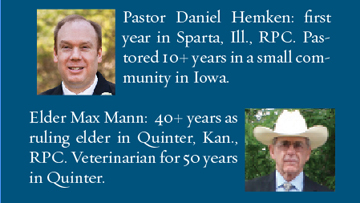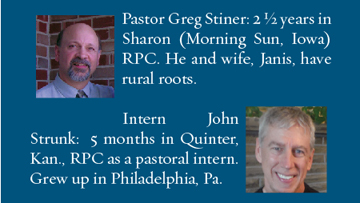You have free articles remaining this month.
Subscribe to the RP Witness for full access to new articles and the complete archives.
There has always been a sort of rivalry or prejudice between city dwellers and country dwellers. Aesop’s fable of “The Town Mouse and the Country Mouse,” written in a whimsical way, illustrates this divergence, which is a disparity that can creep into the church’s vision for the kingdom as well.
For example, much good emphasis in recent times has been made on redeeming the city, moving into urban areas, and reclaiming them through gospel ministry. Tim Keller in Gospel Christianity (p. 150) rightly notes that “God wants us to embody and witness to His gospel and kingdom wherever we live.” But then he adds, “There is no more important place do this than the city.…God began history in a garden (Gen. 2), but He will end it in a city (Rev. 21-22). When Jesus is finished redeeming the world, it will be urban….God through Christ is building a city” (Heb. 11:10).
The new heavens and earth will be urban? Keller’s interpretation seems a bit skewed from a city dweller’s perspective, to say the least, and it minimizes the harvest potential of rural areas in terms of the gospel.
However, is not the Great Commission large enough to encompass both? Jesus said, “Go therefore and make disciples of all the nations,” and “You shall be My witnesses both in Jerusalem, and in all Judea and Samaria, and even to the remotest part of the earth.” Abraham Kuyper’s famous quotation reflects the scope of this gospel mandate: “There is not a square inch in the whole domain of our human existence over which Christ, who is Sovereign over all, does not cry, Mine!” This includes crowded urban communities as well as sparse rural towns and everything in between. There should be no rivalry or prejudice between urban and rural Christians, only the shared urgency to reach the entire world with the gospel.
With this perspective, consider some insights gleaned from the responses of six Reformed Presbyterian leaders who have served from 5 months to 50 years in rural communities. May these gleanings encourage mutual support within the broader church and renewed vision for the advancement of Christ’s kingdom “even to the remotest part of the earth.”
How has your view of rural ministry changed over your ministry tenure?
The unchanging principle recognized is the universality of sin, and the suitability of the gospel of Christ to save sinful man. Beyond this, one leader notes that over the years his focus has shifted more to the priority of “preaching Christ and Him crucified” and away from a primary emphasis on contending for RPCNA positions. Another observes, “I thought of rural ministry with a rural vs. urban, small church vs. large church mentality. Now, I see it more as a spectrum than a dichotomy.” Gospel impact in rural communities can be a slow process. It takes a patient and persevering spirit, as we wait upon our Lord Christ to bring the increase.
How do you engage the rural community in gospel ministry?
The basic principles of gospel ministry must be applied focusing on the centrality of the cross. It is important to cultivate friendships, show mercy by “giving a cup of cold water in Jesus’ name” (Matt. 10:42), teach all that Christ has commanded, and persevere in these gospel endeavors as we anticipate the day of the Lord approaching. Additionally, building and maintaining the infrastructure of a thriving and healthy congregation is paramount.
Numerous practical avenues of ministry include going door to door to introduce the new pastor, a booth at the fair, and personal evangelism in restaurants, laundromats, and stores. Mercy ministry has included a handyman ministry to widows in need, as well as hospital and nursing home visitation. Assisting in promoting Christian candidates in local elections and involvement in local schools has had an impact for Christ. Other endeavors include contributing weekly articles in the local paper, hosting community dinners, and volunteering at food pantries, at crisis pregnancy centers, and for roadside cleanup programs. Ministering the Word through Bible studies, weekly devotions at local care centers, and outreach at community holiday events are additional avenues.
One leader notes that it is important to meet both believers and unbelievers in the community. Frequenting parks, the local gym, and especially high school football games and sports activities are great ways to engage the community. In all of these efforts the goal is to show the love of Christ and to hold forth the Word of life, making prayer the foundation, as we recognize our adequacy is not in ourselves, but from God. He is the Lord of the harvest.
What are the biggest obstacles and opportunities in rural ministry?
A pastor notes that the first obstacle is our own sinful selves. That is certainly true wherever we live as we battle our self-centeredness, fear, and complacency. We need Christ to renew our hearts in order to be effective ambassadors (2 Tim. 1:7). Beyond this rural churches face the obvious—small and/or decreasing populations. This leads to fewer workers and fewer people from whom to draw, as well as members who are widely scattered. Communities are often highly churched, which can make ministry difficult to individuals whose families have been connected to a denomination for generations. Fads, politics, and personalities can have greater sway in smaller populations. School loyalty and pride can be a hindrance to crossing community boundaries. Tight-knit communities can be difficult to break into due to the alienation of sin and distrust of outsiders. Other obstacles include helping people see the church as more than a cultural activity center and persuading people of our genuine concern for their welfare. The greatest opportunity is that as followers of Jesus Christ we have been entrusted with the gospel which overcomes man’s sin. It is “the power of God for salvation to everyone who believes, to the Jew first and also to the Greek” (Rom. 1:16).
Sometimes obstacles can be opportunities. As populations dwindle, the vacuum left creates volunteer opportunities for Christian influence. The experience of a close-knit community may enhance the development of Christian fellowship as new believers are enfolded into the body. Long-established congregations can build on things done well by past Christian soldiers and be strengthened by the record of God’s faithfulness to past generations.
How do you maintain a confessional testimony while interfacing with other denominations in a rural community?
Maintaining a confessional testimony begins with faithful teaching to our own congregations of God’s Word and its truth summarized in our standards. As members grow in a love for the truth of Christ, it will be disseminated in our communities. It is important not only to understand biblical truth, but also to live by an accurate application of God’s Word in daily life. Local elders should be constantly seeking to sharpen their understanding of the Westminster Confession. Furthermore, developing a firm grasp of church history is important.
Beyond congregational preparation is the importance of loving communication. A basic way to speak the truth in love is by adopting a “gentle reformation” mentality, which includes dropping the language of exclusivity and emphasizing the importance of “biblical worship.” It is paramount to focus on the central truths of the gospel, including Jesus’ virgin birth, crucifixion, death, burial, resurrection, ascension, sovereign rule over the kingdoms of the earth, and return. Practical steps include participating in pastor prayer and fellowship groups, while avoiding entanglements in formalized ministerial associations that would lead to violations of convictions and conscience. It is important to take advantage of opportunities to influence, educate, and win other ministers outside RP churches, as well as to work with like-minded Reformed denominations. Inviting the community to psalm sings and joining with community ministry opportunities that do not conflict with RPCNA standards are additional ideas.
What would strengthen your hands the most in rural ministry?
1) Personal spiritual renewal. We must have an increasing confidence in Christ’s work in us and presence with us. We must be growing in the grace and knowledge of Christ (2 Pet. 3:18). We must draw courage and boldness from the Lord in our witness (Josh. 1:9).
2) The prayers of the saints. God has been pleased throughout covenant history to work out His sovereign plan through the prayers of His people. Having prayer support from the broader church is greatly appreciated. Pray for the proclamation of the gospel according to Jesus Christ in the power of the Holy Spirit. Pray for growing love and care for His sheep and lambs in our congregations. Pray for faithfulness in witness and ministry for the glory of God.
3) A greater connectedness. By sensing our union and communion with Christ and His broader church (1 John 1:3, 6-7), we can forge greater ties to our own churches, presbyteries, and church agencies and institutions. Yet this connectivity should function in ways that do not attempt to force the mold of a metropolitan church culture on the rural church.
4) Providing avenues to encourage leadership. If local teaching and ruling elders are renewed in the Lord, congregations will also be spurred on. Focused conferences, seminars, and other resources could be useful to educate broader church leaders as to the problems and joys of rural ministry, as well as to provide instruction and edification for rural church leaders.
5) Kingdom laborers! “Beseech the Lord of the harvest to send out workers into His harvest” (Matt. 9:38). Rural congregations would be strengthened by gifted retired people moving into the rural communities to strengthen the work of the Lord in the session and diaconate of established congregations. Young people discovering jobs in rural areas and immersing themselves in the local church and community, or ministry-minded families and individuals who are looking to encourage and support Christ’s church by relocating to rural areas would be a great help, as would Christian entrepreneurs who are not limited by geographic location, willing to open businesses in towns near rural RP congregations.
May we be encouraged by the commitment and faithful labors of our brethren in rural communities, and also spurred on to lift them up in their unique ministry. Above all, may we see Christ’s kingdom advanced through the gospel ministry of His church, both in the city and the country. “May His name endure forevermore; may it grow as under shining sun. And may people then be blessed in Him, and may all the nations call Him blessed!” (Psalm 72E, Book of Psalms for Worship)
—Wade Mann
Wade Mann has served as a pastor for 23 years in the Lisbon, N.Y., RPC and Shawnee, Kan., RPC. In addition to an M.Div. from RPTS, he has an agricultural business degree from Fort Hays State University. He and his wife Barb have seven children and four grandchildren.
Survey Contributors:
- Pastor Dan Bartel: 5 years in Minneola, Kan., RPC. 29 years in pastoral ministry, much of it rural.
- Pastor Jack Baumgardner: 7 years in Clarinda, Iowa, RPC. Grew up in a rural area.
- Pastor Daniel Hemken: first year in Sparta, Ill., RPC. Pastored 10+ years in a small community in Iowa.
- Elder Max Mann: 40+ years as ruling elder in Quinter, Kan., RPC. Veterinarian for 50 years in Quinter.
- Pastor Greg Stiner: 2 ½ years in Sharon (Morning Sun, Iowa) RPC. He and wife, Janis, have rural roots.
- Intern John Strunk: 5 months in Quinter, Kan., RPC as a pastoral intern. Grew up in Philadelphia, Pa.


